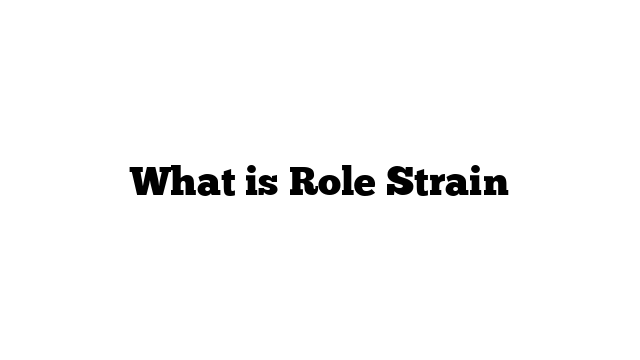Introduction:
Role strain is a concept widely discussed in sociology that refers to the stress and tension individuals experience when fulfilling multiple and often conflicting roles in their lives. In today’s fast-paced and demanding world, many people find themselves juggling various responsibilities such as work, parenting, personal relationships, and community involvement. This article aims to provide a comprehensive understanding of role strain, including its causes, effects, and coping mechanisms.
Defining Role Strain:
Role strain is the stress and pressure experienced when individuals struggle to meet the demands and expectations associated with the different roles they play. It arises when conflicts arise within a specific role or when conflicting roles overlap, making it challenging to fulfill obligations effectively. It is important to differentiate role strain from role conflict, which involves conflicts between different roles.
Causes of Role Strain:
Role strain can stem from various sources, including societal expectations, time constraints, conflicting role demands, and personal preferences. Societal expectations often place unrealistic pressure on individuals to excel in multiple roles simultaneously. For example, working parents may face role strain as they try to balance their professional responsibilities with being present for their children. Time constraints can also contribute to role strain, especially for individuals who have limited time or energy to devote to each role. Additionally, different roles may have conflicting demands, creating tension and placing strain on individuals.
Effects of Role Strain:
Role strain can have significant impacts on individuals’ mental, emotional, and physical well-being. The stress and pressure associated with fulfilling conflicting roles can result in feelings of overwhelm, exhaustion, and burnout. It can also lead to decreased job performance, strained interpersonal relationships, and a diminished sense of self-worth. In extreme cases, role strain can contribute to mental health issues such as anxiety and depression. Moreover, the effects of role strain can extend beyond individuals to affect their families and communities.
Coping Mechanisms for Role Strain:
Individuals experiencing role strain can employ several coping mechanisms to manage and alleviate the stress associated with fulfilling multiple roles. It is crucial to recognize personal limitations and set realistic expectations to avoid overwhelming oneself. Time management skills, such as prioritizing tasks and effectively delegating responsibilities, can also help individuals maintain a sense of balance. Seeking social support from family, friends, or support groups can provide much-needed assistance, understanding, and encouragement. Additionally, practicing self-care activities, such as exercise, mindfulness, and relaxation techniques, can reduce stress levels and promote emotional well-being.
Examples of Role Strain:
To further illustrate the concept of role strain, let’s consider a few common examples. A working mother may experience role strain as she tries to meet the demands of her career while also attending to her children’s needs. The pressure to excel in both roles can lead to feelings of guilt, exhaustion, and a constant sense of not being able to give either role enough attention. Similarly, a college student who works part-time may face role strain as they try to balance studying, attending classes, working, and maintaining a social life. This constant juggling of responsibilities can lead to stress, poor academic performance, and social isolation.
Conclusion:
Role strain is a significant issue that many individuals face as they strive to fulfill multiple roles in their lives. The stress and tension associated with conflicting role demands can have detrimental effects on individuals’ well-being and functioning. Understanding the causes and effects of role strain, as well as adopting effective coping mechanisms, is crucial for maintaining a healthy work-life balance and preserving overall mental and physical health. By managing role strain effectively, individuals can find greater satisfaction, fulfillment, and resilience in their endeavors.
